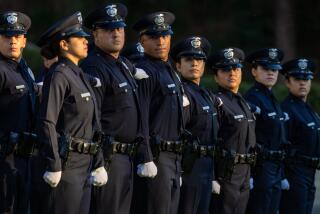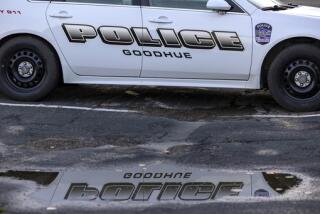Mentoring Afghan police
- Share via
FARAH, AFGHANISTAN — There were two good reasons why Army Capt. Dave Panian made a perilous journey across the desert to this dusty provincial capital.
He wanted to check on his close friend, a district police chief whose family had been threatened by the Taliban. He also wanted to pry loose salaries for the chief’s police officers, who were owed two months’ pay.
Panian, a lanky officer from San Diego, heads a small U.S. Army team training local police officers near the village of Bala Buluk, 40 miles northeast of Farah in southwestern Afghanistan, where his friend Haji Khudaydad is the chief.
Training is the easy part. The hard part is cutting through threats, bureaucracy, cronyism and corruption.
The effectiveness of the police and other local officials is growing in importance as the Taliban moves to regain territory in southern Afghanistan this summer. Afghan and North Atlantic Treaty Organization troops battled the Taliban on Wednesday for control of villages around the city of Kandahar, about 220 miles east of Farah.
Throughout the country, police officers often have been little more than hired guns who raise money for local warlords through illegal taxes, shakedowns and corruption. Many policemen and district officials sell weapons and opium. Some collude with the Taliban.
Trainers such as Panian from the U.S. military and its foreign partners have been working since 2003 to reform the police.
Some units have fought effectively alongside U.S. forces, but others remain mired in cronyism and organized crime enterprises.
With new fighting in southern Afghanistan, the role of police chiefs such as Khudaydad and the loyalty of their officers are crucial.
So Panian got into a shouting match with police finance officers who refused to release last month’s pay. He ended up storming over to the local bank and coming out with a plastic bag stuffed with the equivalent of $14,000 in afghanis, the local currency. But first he warned the officials that there would be “hell to pay” if they didn’t cough up this month’s pay the next day.
Then Panian found out that even though the Taliban had put a $30,000 bounty on Khudaydad, officials refused to help him move his wives and children out of the provincial capital and into the protection of relatives and tribesmen.
After a harrowing seven-hour nighttime drive across the desert in a convoy of policemen, U.S. soldiers and Marines, Khudaydad was delivered back to his Bala Buluk compound. He was relieved to be out of Farah.
“I don’t trust those people,” Khudaydad said of certain provincial officials.
In Bala Buluk, Panian’s 14 trainers live in a spartan compound next to district police headquarters.
They have run about 100 police officers through an eight-week police academy in Herat, about 140 miles to the north, and mentored Khudaydad’s officers daily for six months.
“I won’t deny there’s still corruption, but it’s at a much lower level,” Panian said.
He and his trainers forced out two previous chiefs. One extorted cash from shopkeepers and imposed taxes on passing vehicles. The other ran drugs and guns, U.S. team members said.
The trainers maneuvered Khudaydad into the chief’s job, even though he’s a sergeant major, not an officer. They consider him tough, fair and honest.
“He’s not blameless, but he’s as good as they come based on what we’ve seen here,” Panian said.
Khudaydad, who appears to be in his mid-40s, has a long face, a wispy black beard and expressive brown eyes. He seems to command respect from his men, who listen closely when he speaks.
He fought against the Soviet occupation in the 1980s, and in 2001 turned against the Taliban, which he says has killed 38 family members and fellow tribesmen, including four nephews and two sons.
Twelve of his officers have died since he took over as chief April 2. Some were killed in a vehicle accident, but others died, along with a U.S. trainer, fighting the Taliban in late May.
The Taliban controls much of the countryside in Farah province, where its fighters plant roadside bombs and mount occasional ambushes. A roadside bomb killed four Marines on Saturday.
“I waited a long time for the Americans to come,” Khudaydad said, referring to training, weapons and equipment that U.S. forces have provided.
Marine 2nd Lt. Matthew Bohn, who will replace Panian this month as leader of the local U.S. police training program, said he asked Khudaydad how the Marines could help him.
Bohn said that Khudaydad replied, “Help me kill Taliban.”
Panian said he trusts Khudaydad enough to leave only a few U.S. soldiers to guard the base while the rest go out on patrols.
The arrival this month of a platoon of Marines from Twentynine Palms, Calif., led by Bohn, who is from Davis, has beefed up the outpost’s defenses.
Overall, the trainers have little faith in the police structure. Motorist shakedowns are common, they say, because of a system of tribute that goes all the way up the chain of command.
“The honest officers see corruption up and down the chain and nothing gets done about it, so naturally they get discouraged,” said Capt. Michael Noriega, the U.S. team’s operations chief.
A starting police officer earns the equivalent of $100 a month. Sergeants earn $150 to $170.
They are chronically short of supplies.
Unless U.S. officers go with him to Farah, provincial officials don’t provide anything, Khudaydad said.
“They refuse us when we go alone.”
Khudaydad provides the Americans entree into the tribal power structure, an important component of the fight against the Taliban. He also in effect acts as the district sub-governor because the appointed official rarely shows up for work, Panian said.
And because of his tribal ties and lifelong connections to local elders, Khudaydad provides valuable intelligence. His information was instrumental in operations last month that killed 72 to 115 Taliban fighters, trainers said.
But there are tensions among police units over equipment and authority, and between some police and Afghan army units. Khudaydad’s policemen got into a shootout with an army unit that tried to push past a checkpoint this month.
The next morning, Panian brought the police and army unit commanders together; it was the first time they had met.
“We need to be brothers here, not split up into separate little groups,” the captain told the officers, who sat cross-legged on the floor of Khudaydad’s cramped office. Other commanders should rely on Khudaydad to bridge differences between the police and army, he said.
“He might look like Taliban, but he has the heart of a lion,” Panian said. “I trust him with my life.”
The army platoon leader, a sunburned young man, stood up and shook hands all around. “No problem,” he said. “The Taliban is your enemy -- and our enemy.”
The pay issue was not so easily resolved. Sitting in a dingy office in Farah with the three police finance officers, Panian first pleaded, then challenged the men. But they said they were powerless; the pay was stalled somewhere up the line.
One of the officers smirked, with a “What do you expect me to do?” expression.
Panian, his face reddening, turned to his interpreter and said, “If he doesn’t stop laughing and start taking his job seriously, I’m going to slap him. He disgusts me. Tell him that.”
The interpreter relayed the message. The man stopped smiling.
The finance officers said that if Panian sent a policeman the next day with certain paperwork, this month’s pay would be released. (The salaries were indeed paid the next afternoon.) But if Panian wanted last month’s pay, he’d have to go to the bank himself.
Panian emerged from the bank an hour later with the bag bulging with cash.
“I bought myself a Mercedes,” he joked with Khudaydad later.
Accompanying Panian was Bohn, his successor, learning the job. He paid close attention to Panian’s little drama. The next time, it would be Bohn’s turn.
He said he was ready to take charge, though he had not anticipated “all the little intricacies of Afghan politics.” He has a lot to learn.
Bohn is 25, with 19 months in the Marine Corps and 10 weeks in Afghanistan. Panian is 34, with 14 years in the Army and six months in Afghanistan. Bohn said he wanted to build on Panian’s accomplishments and “put a Marine spin” on the training program.
With the previous month’s pay secured, Panian and Bohn stepped outside the Farah pay office and into the searing sunshine.
“Not good, man,” Panian told the lieutenant. “Get used to it.”
--
More to Read
Sign up for Essential California
The most important California stories and recommendations in your inbox every morning.
You may occasionally receive promotional content from the Los Angeles Times.











